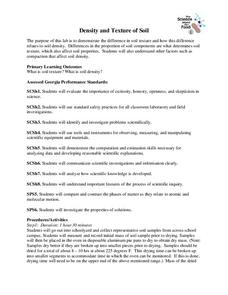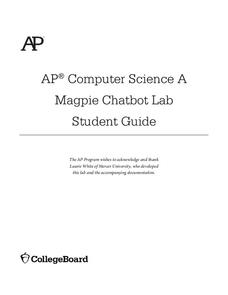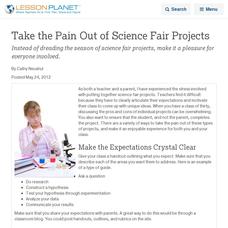Virginia Department of Education
Light and the Electromagnetic Spectrum
Lead your class in a fun-filled team activity that encourages collaboration while learning important concepts. Pupils actively participate in a discussion on the experimental design and the role of mirrors. They perform group activities...
Space Awareness
What is a Constellation
Why do some stars in a constellation appear brighter than others? Using a get-up-and-move astronomy activity, scholars explore perspective and the appearance of constellations in the sky while developing an understanding of the...
National Academy of Sciences
Genetic Disease: Putting DNA to Work
Scientific knowledge of genetic information has grown quickly over the last decade. An interactive lesson has learners research the role of science and medicine in diagnosing and treating genetic disorders. They consider the job of the...
Virginia Department of Education
DNA Structure, Nucleic Acids, and Proteins
What is in that double helix? Explain intricate concepts with a variety of creative activities in a lesson that incorporates multiple steps to cover DNA structure, nucleic acids, and proteins. Pupils explore the history of DNA structure,...
Virginia Department of Education
Modeling the Big Bang Theory
Young astronomers learn about the Big Bang Theory and redshift through a hands-on activity in the last installment of a three-part series. Participants draw dots on balloons and then inflate them to model how galaxies moved farther apart...
Space Awareness
Let's Break the Particles
Build learning by breaking atoms! Young scientists study the way energy changes with a hands-on activity. As they roll steel marbles down a ramp, learners test the hypothesis that kinetic energy does not go away with friction or...
Virginia Department of Education
Metamorphic Rocks
Rocks can bend? Pupils investigate how heat and pressure produce metamorphic rocks by modeling them using clay, and then categorize samples based on observable characteristics. The instructional activity ends with a metamorphic rock...
Teach Engineering
Start Networking!
Class members create their own social networks by collecting signatures before graphing the interactions with their fellow classmates. The degree distribution of the simulated social network is determined by calculating the degree of...
Virginia Department of Education
Animal Phyla and Plant Divisions
Searched hours for an activity that allows individuals the ability to use multiple resources to learn about both plant and animal kingdoms? This discussion and activity provide pupils with the ability to visualize each organism before...
Curated OER
Turtle and Tortoise Preschool Lesson Plan
One of the best parts about teaching the littlest learners is that you can create thematic lessons that use one topic to address every subject. Here is a nice set of thematic teaching ideas that uses turtles and tortoises to teach...
EduGAINs
Go Eco! Ecosystems
How is a movie theater like a desert biome? Compare systems to ecosystems with a set of activities that focuses on accessing multiple intelligences and building upon knowledge. As learners discuss the ways elements of an ecosystem depend...
Virginia Department of Education
Igneous Rocks
High schoolers explore igneous rocks by observing rock samples and considering cooling rates and composition. The third installment of a five-part geology series culminates in an activity where learners use igneous rock characteristics...
Virginia Department of Education
Average Atomic Masses
Facilitate learning by using small objects to teach the principles of atomic mass in your science class. Pupils determine the average mass of varying beans as they perform a series of competitive experiments. They gather data and...
Virginia Department of Education
Building a DNA Model
It has been decades since the discovery of DNA. Still, activities such building this DNA model allow blossoming scientists to better understand the components that form this overall structure. During this activity, they will also...
University of Georgia
Density and Texture of Soil
All soil is not created equal! A lab activity asks learners to collect and analyze soil. Specific calculations determine the amount of sand, silt, and clay in a sample and allow individuals to identify the soil texture.
Space Awareness
Valleys Deep and Mountains High
Sometimes the best view is from the farthest distance. Satellite imaging makes it possible to create altitude maps from far above the earth. A three-part activity has your young scientists play the role of the satellite and then use...
Space Awareness
Meet Our Home: Earth
Earth is a complex structure. Learners explore their home, the earth, using a fun hands-on activity. They create tactile models of the earth using ordinary household materials that represent some common features: land, polar caps,...
Space Awareness
Meet Our Neighbors: Sun
The sun isn't just a ball of yellow! Young scientists learn about the features of the sun using a hands-on modeling activity. They build models of the sun using common household items to represent sunspots, solar prominence, and the...
Virginia Department of Education
Passing Traits to Offspring
What makes each one of us unique? Lead your class in this exciting and educational activity as you uncover traits that show how each individual is different from another. Pupils explore facts about DNA technology and predict the...
College Board
AP® Computer Science A: Magpie Chatbot Lab Student Guide
How is your computer or phone able to talk to you? Explore the tasks needed for a computer to understand human voice input and then write code for a Chatbot with this lab guide.
Howard Hughes Medical Institute
Building Ecological Pyramids
Looking for a fresh take on traditional food/energy pyramids? Conduct an innovative activity where pupils build their own! The lesson uses research data from Gorongosa National Park in Mozambique for a real-life safari touch. Scholars...
University of Georgia
Heating and Cooling of Land Forms
Compare heating and cooling rates of different land forms. A lab activity has groups collect data on the rate of heating and cooling of soil, grass, saltwater, fresh water, and sand. An analysis of the rates shows how the different land...
Curated OER
Take the Pain Out of Science Fair Projects
Instead of dreading the season of science fair projects, make it a pleasure for everyone involved.
Lunar and Planetary Institute
Moon Flip Book
Watch an entire month flash before your eyes with this fun phases-of-the-moon flip book activity.
Other popular searches
- Physical Science Activities
- Halloween Science Activities
- Christmas Science Activities
- Forensic Science Activities
- Hanukkah Activities Science
- Math and Science Activities
- Black Box Science Activities
- Earth Science Activities
- Hands on Science Activities
- Practical Science Activities
- 15 Minute Science Activities
- Global Science Activities

























